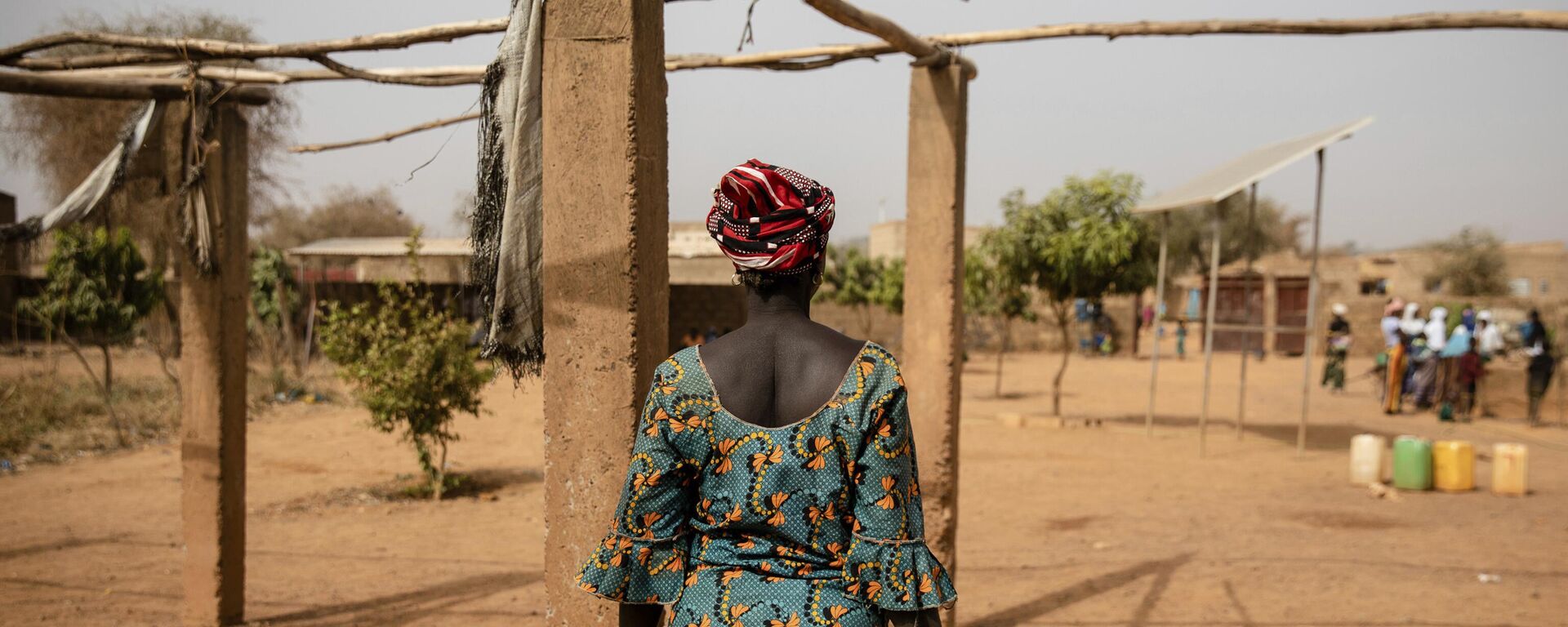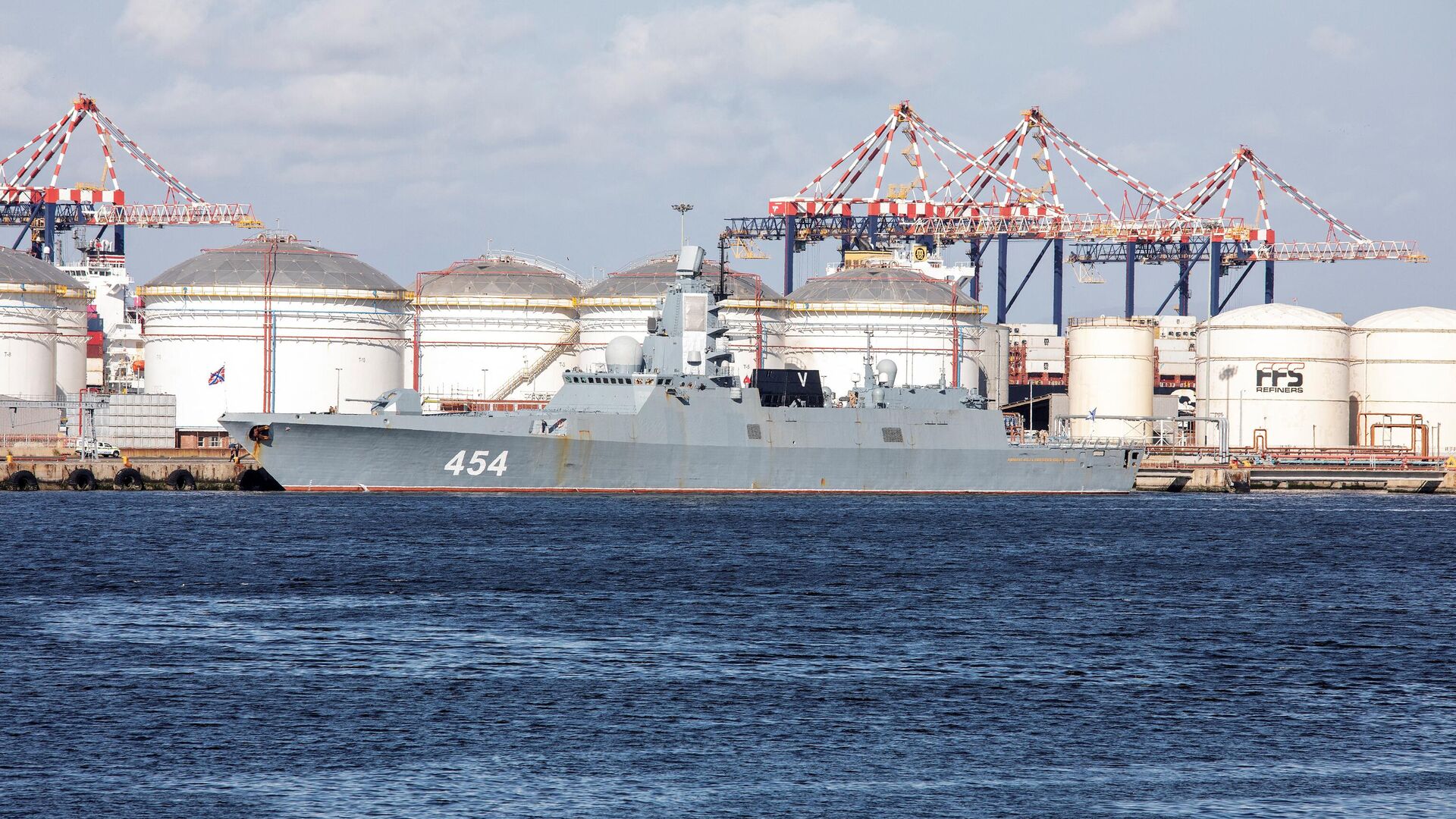https://sputnikglobe.com/20230223/south-africas-military-drills-with-russia-china-crucial-in-face-of-foreign-pressure-expert-says-1107672035.html
South Africa's Military Drills With Russia, China Crucial in Face of Foreign Pressure, Expert Says
South Africa's Military Drills With Russia, China Crucial in Face of Foreign Pressure, Expert Says
Sputnik International
African States should maintain a state of military readiness on all levels in case of foreign military intervention," which mostly come from Western countries, according to the continent's past, says Ian Liebenberg
2023-02-23T08:34+0000
2023-02-23T08:34+0000
2023-02-27T08:07+0000
africa
southern africa
south africa
military drills
naval drills
russia
china
us
africa insight
https://cdn1.img.sputnikglobe.com/img/07e7/02/15/1107671869_0:183:3073:1911_1920x0_80_0_0_b75563c0463c16c8cd44bcd1b00401b2.jpg
The trilateral naval drills involving South Africa, China, and Russia are justified because it is essential to maintain a state of military readiness on all levels in Africa, says Ian Liebenberg, an Extraordinary Professor at the Faculty of Military Science at Stellenbosch University in South Africa, and Professor of Politics at the University of Namibia (UNAM), Windhoek, Namibia in an interview with Sputnik.Since 2012, Russia and China have held bilateral military exercises every year. South Africa joined them for the first time in 2019. There were other countries which also took part in the Russian-Chinese drills, including African states such as Algeria.Elaborating on the role of military exercises, and their possible effect on the security of participating countries in the future, Liebenberg notes that foreign and defense policies of African states should demonstrate an awareness of possible foreign armed interventions, as the formerly colonized continent has learned a great number of painful lessons over many years.Expanding on that, the professor draws particular attention to the behavior of France in West Africa, noting that countries which did not adhere to the dictates of the French faced interference as is illustrated by the 1987 coup against Burkinabe President Thomas Sankara who did not want to kowtow to France.He adds that the 20th century also witnessed the Central African Republic subject to French intervention for many years.In today's world, as experts and observers note, the practice of interference in former colonies' internal still goes on.Earlier this month, for example, in an interview with Sputnik, Michael Bibi, Bishop of the Cameroonian diocese of Buea located in south-west Cameroon, blamed France for using "a complicated network of financial economic policies and political control through the threat of regime change and their military presence to maintain the status quo."According to him, Africa has to throw off the "iron grip" France has on its former colonies.However, lately, Western African countries such as Mali and Burkina Faso have witnessed the withdrawal of French troops from their territory, as the African countries' leaderships ended military cooperation agreements with their former colonizers.Speaking on foreign intervention, Liebenberg provides another example, namely the abuse of the Responsibility to Protect (R2P), a UN initiative, in Libya in 2011 by the US, France, and the United Kingdom, which led to the death of the Libyan leader Muammar Gaddafi and permanent destabilization of the country.In contrast to many other African countries, South Africa has not been subject to direct foreign intervention, but security issues are just as important – as is the problem of pressure from foreign powers.Liebenberg draws attention to Western economic pressure exerted on a number of African nations to make them either vote against Russia or abstain from voting on last year's United Nations General Assembly’s resolution concerning the Russian special military operation in Ukraine.Furthermore, in May 2022 the US House of Representatives adopted a Bill against "malign" Russian activities in Africa that "undermine the United States' objectives and interests". According to this Bill, the US can sanction African countries for cooperation with Russia.Condemning the Bill, South African President Cyril Ramaphosa at a meeting last year with US President Joe Biden, called it a "misplaced type of legislation" which would harm and "marginalize" the African continent.David Feldmann, spokesman for the US Embassy in South Africa, and White House Press Secretary Karine Jean-Pierre have already expressed their concern about South Africa's intention to hold exercises with Russia and China.The participants in the drills - South Africa, Russia, and China - are allies within BRICS (Brazil, Russia, India, China, South Africa), which, Liebenberg says, is, among other things, important in enabling the member countries to obtain more financial independence from the West. BRICS is a bloc whose members are likely to become - or have already become - major global economies. According to Liebenberg, the organization is a "mutual investment in the future", meaning that it acts as an example of how the "East" as well as Global South can determine their own economic future.Commenting on the BRICS members' cooperation in field such as defense – for instance, military drills – Liebenberg notes that BRICS was not initially created as a military bloc, but given the policies of interventions and pressure exercised by the USA and NATO around the world, it can not be ruled out that BRICS in the longer run may see their military interests converge.
https://sputnikglobe.com/20230213/cameroonian-bishop-france-has-affairs-of-former-african-colonies-in-iron-grip-1107366444.html
africa
southern africa
south africa
russia
china
Sputnik International
feedback@sputniknews.com
+74956456601
MIA „Rossiya Segodnya“
2023
News
en_EN
Sputnik International
feedback@sputniknews.com
+74956456601
MIA „Rossiya Segodnya“
Sputnik International
feedback@sputniknews.com
+74956456601
MIA „Rossiya Segodnya“
military drills, military exercises, south africa, ian liebenberg
military drills, military exercises, south africa, ian liebenberg
South Africa's Military Drills With Russia, China Crucial in Face of Foreign Pressure, Expert Says
08:34 GMT 23.02.2023 (Updated: 08:07 GMT 27.02.2023) South Africa is holding trilateral naval military drills with its BRICS partners Russia and China. Taking place off South Africa's eastern coast, the exercises coincided with South Africa's Armed Forces Day on 21 February, are and planned to end on 27 February.
The trilateral naval drills involving South Africa, China, and Russia are justified because it is essential to maintain a state of military readiness on all levels in Africa, says Ian Liebenberg, an Extraordinary Professor at the Faculty of Military Science at Stellenbosch University in South Africa, and Professor of Politics at the University of Namibia (UNAM), Windhoek, Namibia in an interview with Sputnik.
"Geopolitics is undergoing tectonic changes with the balance of power moving from West to East, including Eurasia. Although the shift of power is relatively certain, it does mean [there is] insecurity and possible unpredictable challenges facing the African continent and more pertinently southern Africa," Liebenberg notes.
Since 2012, Russia and China
have held bilateral military exercises every year. South Africa joined them for the first time in 2019. There were other countries which also took part in the Russian-Chinese drills, including African states such as Algeria.
Elaborating on the role of military exercises, and their possible effect on the security of participating countries in the future, Liebenberg notes that foreign and defense policies of African states should demonstrate an awareness of possible foreign armed interventions, as the formerly colonized continent has learned a great number of painful lessons over many years.
"Some [problems] were created by Africans themselves, such as military coups or intrastate conflict, ie the Democratic Republic of the Congo," he says. "However, frequently foreign powers, mostly previous colonizers, intervened in African affairs – even to the extent of toppling African governments."
Expanding on that, the professor draws particular attention to the behavior of France in West Africa, noting that countries which did not adhere to the dictates of the French faced interference as is illustrated by the 1987 coup against Burkinabe President Thomas Sankara who did not want to kowtow to France.
He adds that the 20th century also witnessed the Central African Republic subject to French intervention for many years.
In today's world, as experts and observers note, the practice of interference in former colonies' internal still goes on.
Earlier this month, for example, in an interview with Sputnik, Michael Bibi, Bishop of the Cameroonian diocese of Buea located in south-west Cameroon, blamed France for using "a complicated network of financial economic policies and political control through the threat of regime change and their military presence to maintain the status quo."
According to him, Africa has to throw off the "iron grip" France has on its former colonies.

13 February 2023, 12:44 GMT
However, lately, Western African countries such as Mali and Burkina Faso
have witnessed the withdrawal of French troops from their territory, as the African countries' leaderships ended military cooperation agreements with their former colonizers.
Speaking on foreign intervention, Liebenberg provides another example, namely the abuse of the Responsibility to Protect (R2P), a UN initiative, in Libya in 2011 by the US, France, and the United Kingdom, which led to the death of the Libyan leader Muammar Gaddafi and permanent destabilization of the country.
"The consequences [of the intervention] were disastrous. Using the so-called Arab Spring as an excuse, the French, the United Kingdom, and the United States of America intervened with their military might," the professor notes, adding: "Obviously apart from ideological reasons, the West and the USA wanted to get hold of Libyan scarce resources - especially oil."
In contrast to many other African countries, South Africa has not been subject to direct foreign intervention, but security issues are just as important – as is the problem of pressure from foreign powers.
Liebenberg draws attention to Western economic pressure exerted on a number of African nations to make them either vote against Russia or abstain from voting on last year's United Nations General Assembly’s resolution concerning the Russian special military operation in Ukraine.
Furthermore, in May 2022 the US House of Representatives adopted a Bill against "malign" Russian activities in Africa that "undermine the United States' objectives and interests". According to this Bill, the US can sanction African countries for cooperation with Russia.
Condemning the Bill, South African President Cyril Ramaphosa at a meeting last year with US President Joe Biden,
called it a "misplaced type of legislation" which would harm and "marginalize" the African continent.
"We should not be told by anyone whom we can associate with, and we should never be put in positions where we have to choose who our friends are," Ramaphosa told reporters after his meeting with Biden.
David Feldmann, spokesman for the US Embassy in South Africa, and White House Press Secretary Karine Jean-Pierre have already expressed their concern about South Africa's intention to hold exercises with Russia and China.
The participants in the drills - South Africa, Russia, and China - are allies within BRICS (Brazil, Russia, India, China, South Africa), which, Liebenberg says, is, among other things, important in enabling the member countries to obtain more financial independence from the West.
BRICS is a bloc whose members are likely to become - or have already become - major global economies. According to Liebenberg, the organization is a "mutual investment in the future", meaning that it acts as an example of how the "East" as well as Global South can determine their own economic future.
Commenting on the BRICS members' cooperation in field such as defense – for instance, military drills – Liebenberg notes that BRICS was not initially created as a military bloc, but given the policies of interventions and pressure exercised by the USA and NATO around the world, it can not be ruled out that BRICS in the longer run may see their military interests converge.
According to Liebenberg, "it is perhaps too early to speculate whether BRICS may evolve into a new pole of military power." However, he notes, "the relentless push by the USA, and pressuring its junior NATO partners ever since the late 1990s - and especially the USA's economic war since 2008 against China and Russia and its effects on Africa - could trigger other developments, for example in the military field."



